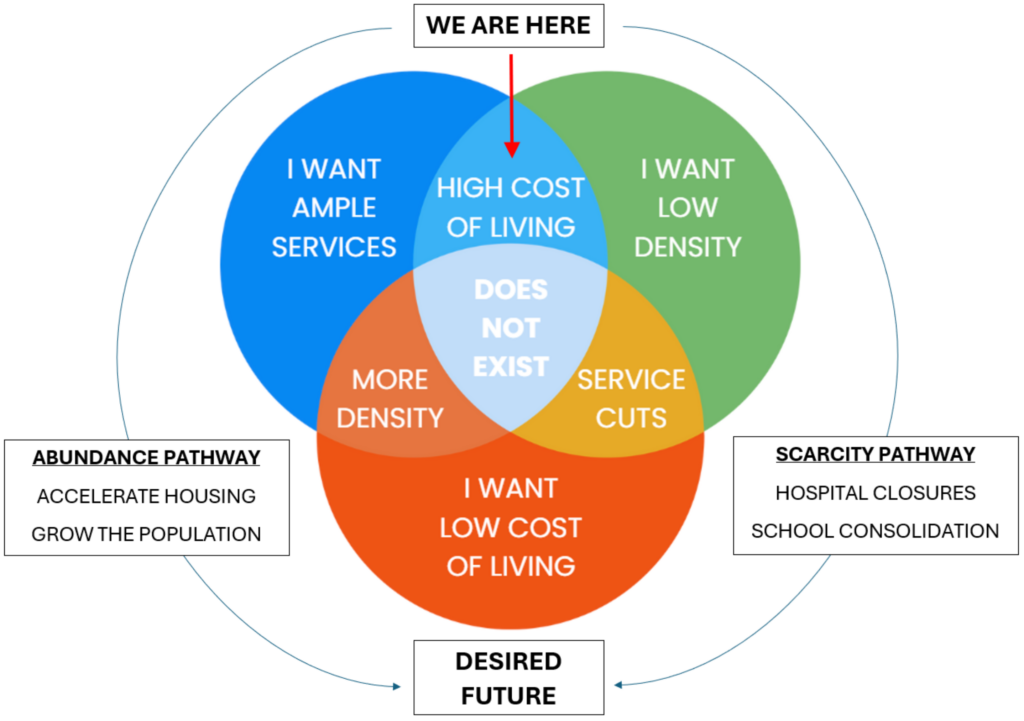As Town Meeting break concludes and the Legislature prepares to return to Montpelier next week, the stakes have never been higher. Vermont’s economic and legislative landscape is at a critical juncture, and this special edition of State to Main highlights the progress, challenges, and opportunities that lie ahead for our state’s economy. The Vermont Chamber’s focus remains aligned with what Vermonters expressed at the polls in November—addressing affordability, spurring economic growth, and tackling Vermont’s toughest challenges head-on. In a time when rising costs in critical areas like education finance, housing, and healthcare are straining families and businesses, our commitment to thoughtful, data-informed progress is more essential than ever.
The Stakes: Navigating Demographic Realities
Vermont’s unique character is our greatest asset, yet our demographic trends demand urgent attention. Since 2000, our population has remained relatively stagnant while shifting dramatically toward an older demographic. More than one-fifth of Vermonters are 65 or older, and over 35 percent are already past 54—the age when many exit the workforce. With the state recording the lowest fertility rate in the nation and retaining only about 43% of its college graduates, we have experienced negative net migration from 2010 to 2020. Our high dependency ratio further underscores the mounting burden on an increasingly dwindling economically active population. Compounding these challenges is Vermont’s fiscal environment—ranking as the third-highest state in the nation for tax collections per capita. With property and individual income taxes as our largest revenue sources, families and businesses are increasingly strained by limited housing options and rising costs. To reverse these trends, Vermont must add an average of 13,500 workers annually over the next 10 to 15 years. The Vermont Economic Action Plan sets a bold, necessary target: expand our population to 802,000 by 2035. This growth isn’t for its own sake; it is essential to revitalizing our communities, strengthening our tax base, and ensuring every Vermonter benefits from a vibrant economy.
Housing: The Cornerstone of Prosperity
Our housing market paints an equally urgent picture. Vermont once built housing at a brisk pace, but in recent decades, production has slowed dramatically. According to a statewide needs assessment, we require 36,000 new housing units by 2029—translating to about 7,200 new homes annually over the next five years—to adequately meet demand. Yet, last year, only 2,500 units were permitted, highlighting a critical shortfall. Without significant intervention, our housing shortage will continue to drive up prices, placing a severe financial burden on families and stifling community resilience. Addressing these barriers—by streamlining permitting processes, incentivizing higher-density and mixed-use developments, and revising financing mechanisms—is essential if we are to triple our housing output over the next decade. Relying on quick fixes will only mask the problem; real, sustainable change demands that we tackle outdated housing production models and systemic fiscal pressures at their core.
A Call to Action: Embrace Abundance
Vermont’s future is a choice between two distinct paths. One path leads to rising costs, diminished public services, and a stagnating economy—a future defined by scarcity. The alternative is a future of abundance, where strategic growth cultivates a thriving business climate, robust public services, and affordable living for all Vermonters. While quick fixes may seem appealing, they fall short of creating sustainable change. Real progress requires us to confront the root causes of our challenges—demographic shifts, outdated housing production models, and systemic fiscal pressures—through honest conversations, shared commitment, and a willingness to embrace compromise. Only by addressing these underlying issues can we create lasting solutions that secure Vermont’s economic future.
Now, more than ever, our collective future depends on embracing a growth mindset—one that moves beyond partisan divides to unite us in pursuit of a more affordable and sustainable Vermont. The data is unequivocal: Vermonters overwhelmingly support policies that promote growth and opportunity. The road ahead may be challenging, but with bold action, informed strategy, and a unified vision, our future is abundant. Let’s work together to ensure that Vermont remains a place where businesses thrive, communities prosper, and every individual has the opportunity to succeed.
Member-Driven, Data-Informed: Shaping Vermont’s Future
Our work is both member-driven and data-informed. Thoughtful, evidence-based policies are key to reducing costs, growing our economy, and creating opportunities for all Vermonters. The data visualizations below highlight critical trends—from housing shortages and demographic shifts to escalating healthcare costs—that underscore the challenges we face. At the Vermont Chamber of Commerce, we know that these issues do not rest on the shoulders of any one party, organization, or community alone. By collaborating and using data as our guide, we can advocate for solutions that make a real difference for every Vermonter.










